The Triffids
The Triffids
Corner Hotel
Tuesday 6 December 2016
$50
SAVE WHAT YOU CAN
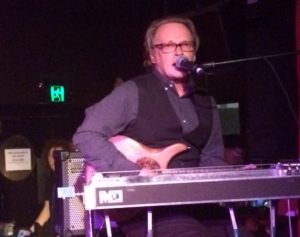
Evil Graham Lee – front and slightly to the side as always
What better birthday present for my brother Graeme than a Triffids t-shirt to commemorate a stirring reunion show at The Corner Hotel. If nothing else it would save me coming up with any other ideas and might make a nice change from the usual slab of beer, although I’d probably still have to add in a six-pack just to make it worthwhile.
When I arrived I’d spotted two designs on display at the merch desk: one featuring black swans and another depicting a band portrait, circa mid-1980s. We thought the black swans design made the more powerful sartorial statement, but when we wandered over to the merch desk at the conclusion of the gig, we discovered that the only t-shirts remaining were those with the band portrait in size 10.
Size 10! I don’t know who they thought might be attending this show, or if they knew something I didn’t about the average age and girth of The Triffids fan base, but size 10! Even when I first saw The Triffids play at the Venetian Room – a small upstairs room at a hotel on Lonsdale Street – in 1984 as a svelte 20 year old, I very much doubt that I would have fitted into a size 10 t-shirt. Let alone now in my portly late-middle age.
And without wishing to body shame an entire venue, a size 10 would have been a rather snug fit even for those people at the show who could have squeezed into it. Even those still basking in the slimming effects of their heroin chic period from the band’s late 1980s heyday were probably seeking a Large.
The Long Fidelity
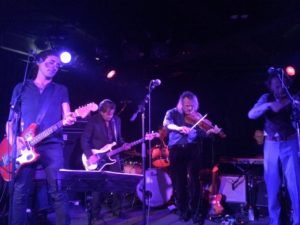
Gareth Liddiard, Martyn Casey, J.P. Shilo and Rob McComb perform Stolen Property
Of course we weren’t there to pick out a summer wardrobe. We were there to see The Triffids play the first of a handful of dates in Australia and Europe to celebrate the 30th anniversary of the release of Born Sandy Devotional, their classic 1986 album.
The quality of the writing, playing, production and arrangements on this album are such that it remains a staple of ‘All-time Best Australian albums’ lists, despite not spawning a hit single or troubling the album charts in its time. The album’s best known song, Wide Open Road, was universally well regarded, but never received high rotation play on commercial FM radio stations, and there was no national youth music station to champion local independent music – Triple J was known as Double J and was just an urban Sydney station at the time.
The Australian bands gaining airplay at the time were the perennials Midnight Oil, INXS, Icehouse and Australian Crawl. The big Australian song of the year was John Farnham’s You’re The Voice and its parent album Whispering Jack, while the newer bands being pushed by Molly Meldrum on Countdown and commercial radio were New Romantic wannabees like Wa Wa Nee, Pseudo Echo, Kids in the Kitchen and Boom Crash Opera. People are right to say that Molly championed Australian music – he did – he just didn’t always pick the good stuff.
The Triffids were relatively unknown outside the inner city circles of new wave fans wearing black suit coats and pointy shoes (boys) or brown suede mini skirts or floral dresses with Doc Martens (girls). Which makes it all the more remarkable that Born Sandy Devotional has achieved its current mantel as an Australian classic. Perhaps it also offers some solace to musicians and other artists that on rare occasions, true quality does win out.
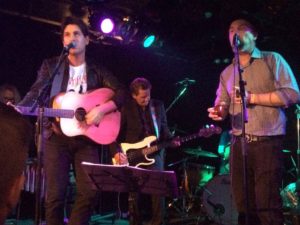
Alex Gow and Rob Snarski lie together on the estuary bed
The album was released in a pivotal year for independent or alternative music. Internationally The Smiths released The Queen is Dead, REM gave us Life’s Rich Pageant, PIL produced Album, Husker Du bashed out Candy Apple Grey (and I mean bashed out!), Sonic Youth gave us Evol, The Fall released Bend Sinister (and probably several more compilations and live albums) and Elvis Costello issued not one, but two exceptionally high quality albums, King of America and Blood and Chocolate. Added to this, Paul Simon put out the soon to be ubiquitous Graceland.
Providing the yang to all this yin, and perhaps just to be perverse, Dylan released arguably his worst album to that point, Knocked Out Loaded. The Rolling Stones continued their inexorable slide with Dirty Work while the less said about Lou Reed’s Mistrial the better.
If The Triffids’ album didn’t get drowned out by all of this noise emanating from overseas, there was also plenty of competition from compatriots, many of whom released their best, or close to best album to date. The Go Betweens released Liberty Belle and The Black Diamond Express; The Saints gave us All Fools Day; Ed Kuepper released Rooms of the Magnificent, The Church put out Heyday, Hunters & Collectors released Human Frailty; Paul Kelly released his breakthrough double album Gossip, Died Pretty and Harem Scarem produced debut albums, Free Dirt and Pilgrim’s Progress respectively, and Nick Cave and The Bad Seeds released two albums, Kicking Against the Pricks and Your Funeral, My Trial. If this wasn’t enough, The Triffids themselves put out a second album later in the same year – In The Pines.
Turntables were in constant spin and tape decks whirred continuously that year and there was plenty of competition for the indie kids’ ears and wallets. It would have been easy for Born Sandy Devotional to get lost among all of this glorious noise, so it is testament to the album’s quality and the strength of the songs that not only has it survived across the decades since, but even more impressively, it survived the overblown 1980s production values that prevailed n that era.
[Contextual aside: More importantly, Hawthorn defeated Carlton to win the premiership and Dipper won the Brownlow – what a year!]
Place in the Sun
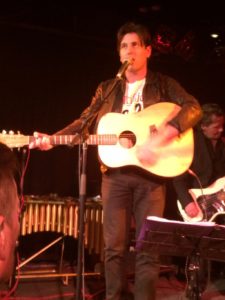
Alex Gow – these are a few of my personal thngs
The band had been playing most of the songs from Born Sandy Devotional live in the months leading up to the album’s release. In Melbourne these gigs often took place at The Club in Smith Street, Collingwood. Chicken Killer, Life of Crime, Lonely Stretch, Estuary Bed, Personal Things and Stolen Property, which McComb would introduce as the best song he’d ever written, were all part of the setlist. And Wide Open Road was the advance single, so the album didn’t feel all that new to me upon its eventual release, although the strings and lavish production elevated the material beyond the live context and contributed to its aura as an immediate masterpiece.
For two nights at The Corner Hotel the band were to perform the album in its entirety, followed by an appearance at the Meredith Festival and subsequent dates in Europe. It was a rare reunion of the band since the death in 1999 of lead singer and songwriter, David McComb.
I had seen the reunited band perform with guest vocalists as part of the Melbourne Festival some years back. It was an excellent show: the festival setting and Hamer Hall made it something of a special occasion, and Steve Kilbey was one of the guest vocalists.
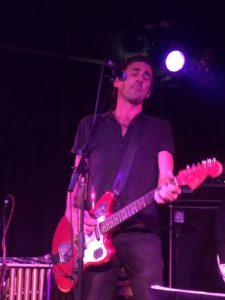
Gareth Liddiard channels David McComb
It is difficult to know where nostalgia ends and a museum piece begins, but any doubts as to how often The Triffids can continue to reform for such shows are allayed by a casual glance through any gig guide. It quickly becomes apparent that there is no impediment or statute of limitations on old bands performing. Proving the adage that old bands never die, they just tour Australia, The Troggs recently played The Tote and this summer’s various winery line-ups feature Simple Minds, Blondie, The B-52s, Cyndi Lauper, Don Henley, James Taylor, Icehouse and of course, John Farnham. If not for the elevated prices of these shows ($100 + for Icehouse and James Reyne at the Royal Botanic Gardens!), you could be forgiven for thinking that it was still 1986. And who knows which original band members will be coming? The Jam, or rather From the Jam toured Australia last year with just bassist Bruce Foxton from the original line-up, while Gang of 4 last toured with only guitarist Andy Gill. Most alarmingly, Bananrama toured without Siobhan – the cutest of the three.
This is the third or fourth iteration of a Triffids revival, so based on the above, there are hopefully many more still to come. It’s possible, however, that their occasional sparks of activity are dependent on the surviving members all being able to coordinate leave from their current jobs (did I once read that a couple of them are school teachers?) at a time that coincides with a break in the Bad Seeds schedule so that bassist Martin Casey can be available. Plus there has to be some motivation, and while the anniversary of Born Sandy Devotional’s release is significant enough to justify a reunion, there are some fans like me who would welcome any excuse.
David Devotional
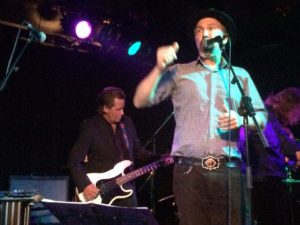
A black-eyed susan and a bad seed – Rob Snarski on vocals and Martyn Casey on bass
Not many bands survive the death of their lead singer, let alone successfully transcend such a catastrophic event. Of Nirvana (Kurt Cobain), The Doors (Jim Morrisson), Queen (Freddie Mercury), INXS (Michael Hutchence), The Angels (Doc Neeson), AC/DC (Bon Scott) and Joy Division (Ian Curtis), only the final two of those bands could be said to have thrived since the death of their frontman. And of those two, AC/DC still base most of their set around songs from the Bon Scott years, while Joy Division not only changed their name to New Order, but also changed their genre to throw off any ghoulish fans. Even The Wiggles had to return to the original Yellow Wiggle after his various replacements just couldn’t do proper justice to the yellow skivvy.
Of course The Triffids had already broken up, or were in extended hiatus, at the time of McComb’s death, but even so, there was never any thought that they could continue without him. He wrote the songs for a start. But it’s a hard gig. To illustrate this point, consider that while McComb may not have been as charismatic as Jim Morrison, Freddie Mercury, Bon Scott or Michael Hutchence, it still took four people to replace him for this gig, and even then they only got close. Rob Snarski (Blackeyed Susans), Adam Gow (Oh Mercy), Gareth Liddiard (The Drones) and J.P. Shilo (pretty much every other Australian indie band) were enlisted to sing McComb’s evocative lyrics on this occasion. They were each excellent and they each sang songs suited to their individual style, which in itself, highlights McComb’s versatility as a performer.
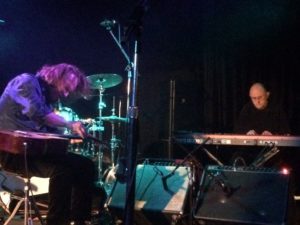
J.P. Shilo and Chris Abrahams get ambient
I was standing near the front and met friends Fiona and Annie while J.P. Shilo and Chris Abrahams played a support set of minimalist ambient sounds.
Abrahams picked out notes on the piano from which a theme slowly emerged, while J.P. Shilo manipulated the strings of his guitar with various implements, including at one stage chalk, fiddled with effects pedals and even tapped out a rhythm of sorts on the vibraphone. It wasn’t devastatingly brilliant, but it was diverting enough and left some aural space in which we could quietly chat.
Despite the show ostensibly being a celebration of Born Sandy Devotional, the band opened with Too Hot To Move, Too Hot To Think from The Black Swan LP, sung by Graham Lee. This was a standard show opener in their latter years, but I don’t know if it was performed first here as a way of showcasing a song without the ring-in singer, or simply as a way of setting the levels. Or just ‘cos.
Sitting in with the band on keyboards right from the start was The Necks’ Chris Abrahams, who also played on Born Sandy, while J.P. Shilo played guitar and violin. Rob Snarski joined the lineup to lend his smooth vocals to The Seabirds and he was joined for Estuary Bed by Alex Gow, with Clare Moore on vibraphone.
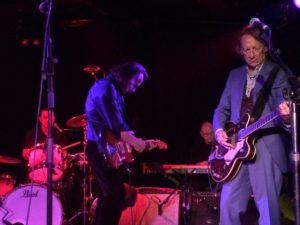
J.P. Shilo & Rob McComb
Vocal duties alternated throughout the set with Jill Birt emerging from behind her keyboard to sing Tarrilup Bridge, as she did on the original. Gareth Liddiard made his first appearance to a huge cheer to give Lonely Stretch a typical Liddiardian burst of impassioned paranoia. There are few other singers who could so convincingly capture the internal turmoil of the narrator as he gets lost and in turn loses himself on Australia’s outback roads.
The honour of singing McComb’s most famous road song, Wide Open Road, was given to Snarski. He is, after all, the ‘go to’ man for a Triffids song and was one of McComb’s favouite singers, so much so that when they formed The Blackeyed Susans together, McComb more or less relinquished vocal duties to his collaborator’s more honeyed tones. As you would expect, Wide Open Road lost none of its sense of hopeless longing in Snarski’s rich voice.
Shilo perhaps came closest to actually channeling McComb’s baritone in his faithful rendition of Life of Crime, so Gow’s nasally Dylanesque voice provided something of a contrast in Personal Things.
With Gareth Liddiard on hand, there was only ever one man who could tackle the mix of tenderness and bombast required for Stolen Property, and he duly invested the song with all his spitting, emotive vocal dynamics.
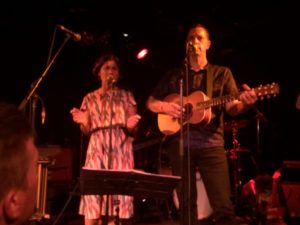
“Baby, let’s go out tonight.” Jill Birt and Alsy MacDonald
Alsy MacDonald emerged from behind the drum kit to join wife Jill Birt for the album’s final song and touching coda, Tender is the Night (The Long Fidelity). The song’s opening verse was almost unbearably poignant given its premonitory revelation:
‘I knew him as a gentle young man,
I cannot say for sure the reasons for his decline,
We watched him fade before our very eyes,
And years before his time, and years before his time’
Surely I was not the only one tearing up at that moment. The song’s final couplet, ‘Baby let’s go out tonight, it’s getting dark earlier now, but where you are, it’s just getting light’ is sung as a duet for male and female voice. This beautiful line is at once a bland description of the geographic reality faced by lovers on opposite sides of the world, as well as a profound meditation on dislocation and death. Coming as it does after the raging storm of Stolen Property, its tone of quiet acceptance acts as the perfect denouement to a perfect album.
Between Ourselves and the End at Hand
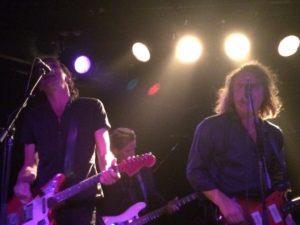
Gareth Liddiard and J.P. Shilo walk a field of glass
I’d have been satisfied had the show ended there, but with Born Sandy duly ticked off and celebrated, the band continued through other highlights from their catalogue.
If nothing else, this served to remind listeners that The Triffids were more than just a one album wonder. Trick of the Light, Hell of a Summer and In the Pines would make any Triffids ‘best of’ playlist, but in addition, J.P. Shilo chimed in with less obvious highlights, Bright Lights, Big City and Unmade Love.
Chris Abrahams also gave us an unexpected bonus with little taste of the piano instrumental Calenture that led into Gow’s emotional finale, Save What You Can. Alex Gow didn’t invest his performance with quite the same melodramatic flourish as McComb’s recorded version, but it still packed its emotional punch as it closed out the set.
Hearing Gow sing the song’s closing lines: ‘And between ourselves and the end at hand, save what you can…’ I couldn’t help but reflect that perhaps that in itself is reason enough for such reunion shows.
Raining Pleasure
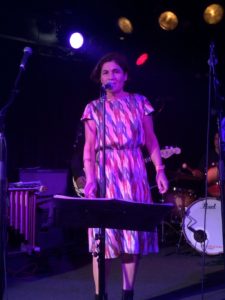
Jill Birt – just before driving off Tarrilup Bridge
When I was young and attending Triffids shows, I could never understand why an accomplished singer like McComb would relinquish the vocals to Jill Birt’s less nuanced vocal stylings. To me it seemed like the waste of a good song. Of course I eventually realised that variety and contrast added to the whole and that the songs Birt sang worked better precisely because she was singing them.
Raining Pleasure was a case in point and was always a highlight of their shows. As was often the case in the past, it was offered here as an encore with Birt out front. She appears to be a more confident singer now than she was in the past, but her stage mannerisms still betray a degree of awkwardness. Singing Raining Pleasure, she kept her gaze fixedly down and rocked back and forth on her heels while swinging one arm in a motion that suggested she was pulling on a lever to wind herself up. Perhaps that is just how she maintained balance? Either way, this song was always her party piece and she sang it with greater confidence than in the past.
For the finale, Gareth Liddiard returned to the stage to deliver Field of Glass. This song, with its confessional tone and brimstone interlude, represented McComb at his most Cave-esque, and was always a live favourite. So it proved here with Liddiard thrashing away at his guitar and delivering the song with the sort of bluster that only he can conjure. In the absence of McComb that is.
And in the end, for both performers and audience alike, the absence of McComb was keenly felt on the night.
In recognition of this, I believe it will always be a worthwhile exercise to commune every few years and celebrate the extraordinary songs of David McComb. And if anyone is going to keep his remarkable legacy alive, it may as well be the remaining Triffids. Just print more t-shirts next time.
Setlist
Too Hot To Move, Too Hot To Think (Graham Lee vocals)
The Seabirds (Rob Snarski vocals)
Estuary Bed (Rob Snarski & Alex Gow vocals)
Chicken Killer (Alex Gow, Clare Moore & another unidentified female vocals)
Tarrilup Bridge (Jill birt vocals)
Lonely Stretch (Gareth Liddiard vocals)
Wide Open Road (Rob Snarski vocals)
Life of Crime (JP Shilo vocals)
Personal Things (Alex Gow vocals)
Stolen Property (Gareth Liddiard vocals)
Tender is the Night (Jill Birt & Alsy MacDonald vocals)
– – – – – – – – – – – –
Trick of the Light (Alex Gow vocals)
Beautiful Waste (Alex Gow vocals)
Hell of a Summer (Rob Snarski vocals)
In the Pines (Rob Snarski vocals)
Good Fortune Rose (Jill Birt vocals)
Bright Lights, Big City (JP Shilo vocals)
Unmade Bed (JP Shilo vocals)
Calenture (Chris Abrahams piano)
Save What You Can (Alex Gow vocals)
– – – – – – – – – – –
Raining Pleasure (Jill Birt vocals)
Field of Glass (Gareth Liddiard vocals)

Leave a Reply